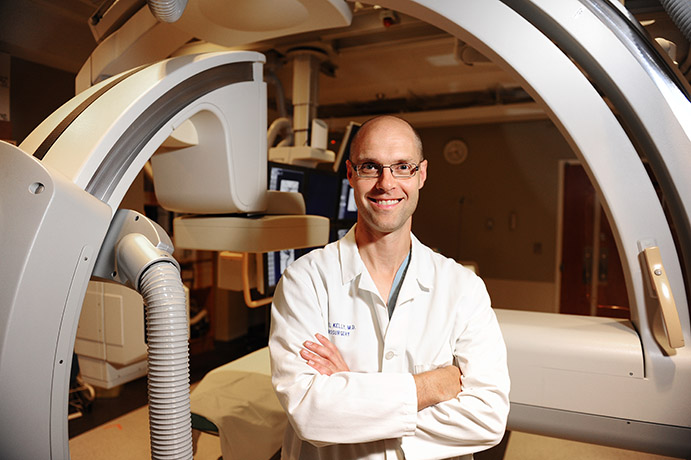
Committed to stroke research
With a renewed funding commitment of $1.5 million over five years, Dr. Michael Kelly (BSc’95, MD’98) will continue his work in the College of Medicine as the Saskatchewan Clinical Stroke Research Chair.
With the Heart and Stroke Foundation, Saskatchewan Health Research Foundation and the College of Medicine each providing $500,000, the chair will be funded from November 2017 to October 2022.
Kelly, who oversees a robust basic science and clinical research program, has held the Saskatchewan Clinical Stroke Research Chair since 2012. During the first five-year term, Kelly and his team helped develop the Acute Stroke Pathway that enables patients who display signs of stroke have access to care in the critical first few hours.
“We think, in this province, there are about 2,000 strokes in the formal database per year,” said Kelly, an associate professor of surgery. “But we think that database is probably off by about 30 or 40 per cent, so maybe 3,000 a year. And in Saskatoon we have one or two stroke alerts in the emergency department per day at RUH— so it’s a common problem.”
So common, in fact, that nearly 14,000 Canadians die from stroke each year, and there were an estimated 50,000 strokes across the country in 2012, making it the third leading cause of death.
“Stroke is a tough disease because it’s much harder to diagnose than, say, a heart attack where everybody knows the symptoms,” he said.
While symptoms can vary, Kelly continued, they often include "one side of the body weakens, or paralysis of the arm, leg or face; numbness; loss of sensation; (a stroke on the) left side of the brain often is accompanied by difficulty with speech. And if the basilar artery, which supplies your brainstem, is affected it can give patients all sorts of problems from double-vision, and unsteadiness to coma.
“A huge portion of stroke is the rehab, the homecare, and probably—most importantly—the prevention of stroke,” Kelly said.
And the prevention for stroke is pretty similar to the heart attack preventative measures most of us are already aware of: manage stress; quit smoking; maintain a healthy weight; control blood pressure and cholesterol levels; nurture an active lifestyle; and drink alcohol in moderation.

